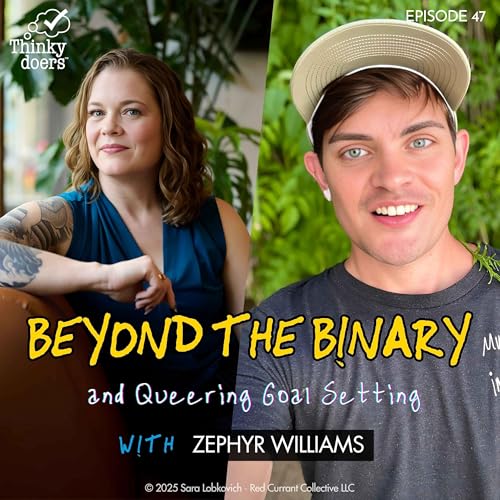
Ep 47 - Beyond The Binary and Queering Goal Setting
No se pudo agregar al carrito
Add to Cart failed.
Error al Agregar a Lista de Deseos.
Error al eliminar de la lista de deseos.
Error al añadir a tu biblioteca
Error al seguir el podcast
Error al dejar de seguir el podcast
-
Narrado por:
-
De:
Today's guest, Zephyr (Zeph) Williams (they/them), is an anti-hustle business strategist who helps radical entrepreneurs build "breathe-easy businesses." When Zeph and I connected over our mutual loathing of SMART goals on social media, I knew we had to have this conversation.
In this episode, we're diving deep into why traditional goal-setting methods fail so many of us—especially neurodivergent folks and anyone who doesn't fit the conventional mold. Zeph introduces their revolutionary SLIC method (Sustainable, Long-term, Iterative, Consistent) and shares why self-care isn't optional—it's strategic. But the real magic happens when we land on a beautiful reframe that might just change how you think about achievement forever.
Want to see how No-BS OKRs fit into a coherent Connected Strategic Stack?
This No-BS Connected Strategy Guide shows you what “good” looks like. Download examples of finished Connected Strategic Stacks — including best practice No-BS OKRs — and get instant clarity on your next strategic step. Includes a quick self-assessment to pinpoint your organization’s biggest OKR opportunities.
GET THE GUIDE
Episode Highlights:
- Why SMART goals create a restrictive binary that crushes creativity and exploration
- The semantic problems with SMART goal terminology that create confusion and ambiguity
- How "specific" goals create tunnel vision that blocks curiosity and the learning journey
- The SLIC Method: Sustainable, Long-term, Iterative, and Consistent goal-setting
- Why self-care isn't selfish—it's a strategic foundation for sustainable success
- How to reconnect with your body through micro-practices and energy tracking
- The role of grace and compassion when breaking free from binary thinking
- What "queering" business practices means and why it's for everyone
- The beautiful reframe from "goal setting" to "becoming"—asking "What am I becoming?"
- Why consistency means showing up as your needs allow, not the same way every day
- How traditional goal-setting often leads to self-abandonment and disconnection from the body
Key Concepts Explored:
- The binary nature of SMART goals and why they create a restrictive pass/fail mentality
- The SLIC Method as an alternative: Sustainable, Long-term, Iterative, and Consistent goal-setting
- Self-care as a radical act of rebellion against systems that devalue your worth
- "Queering" business practices to move beyond traditional binary frameworks
- The shift from "goal setting" to "becoming" as a more expansive approach to growth
- Body-based awareness and reconnecting with somatic needs during goal pursuit
- Why consistency means showing up according to your capacity, not rigid daily habits
Common Questions Answered:
- Why do SMART goals feel so restrictive and overwhelming?
- What makes the SLIC method different from traditional goal-setting?
- How do you start reconnecting with your body if you feel disconnected?
- What does "queering" goal setting actually mean?
- How do you define consistency without burning out?
- Why is self-care considered strategic rather than selfish?
Notable Quotes:
"SMART goals are very binary. You either succeed or you fail. And I'm not somebody who does the binary very well." - Zeph Williams [00:03:00]
"When I hear 'specific,' it feels like a narrowing down... You don't get to enjoy the journey and enjoying the...


